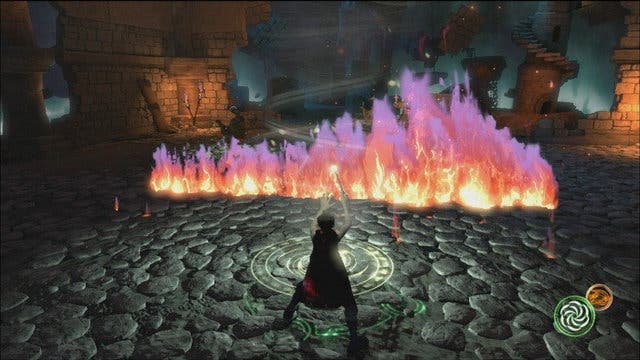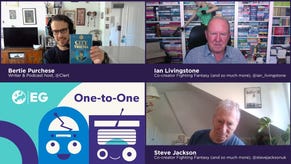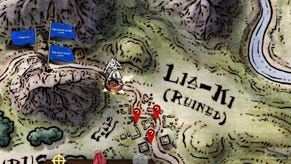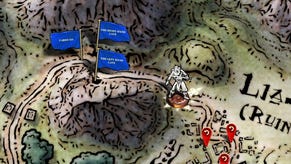Sorcery
It's a kind of magic.
There won't be a huge selection of basic spells in Sorcery - only about six to eight, we're told. The meat of the game comes from combining their various effects. There's a whirlwind spell that you cast by swirling the Move controller above your head in a spiral and then pointing at the screen to guide it around. Create a fire wall before casting the whirlwind and you can catch the flames in the vortex before carrying them off.
All the while the PlayStation Eye is watching you like a stalker in the bushes. Crouch down and the sorcerer on-screen crouches too. It's the combination of these two elements - the in-hand device and the camera tracking, of which Microsoft and Nintendo only have one each - which makes Move feel like a natural way of incorporating motion control into traditional games. More natural, in fact, than anything Kinect or Wii seem able to offer at this point.
The truth is that motion control is intuitive when you have something in your hands. Watching the Weasley twins demonstrating Harry Potter and the Deathly Hallows on Xbox 360 while their characters moved for them automatically on-screen at EA's gamescom press conference was pretty unconvincing. Unlike Kinect, PlayStation Move isn't limited by the absence of buttons and an analogue stick. The motion control augments the game rather than defining it.
The potions scattered around Sorcery's world are a cute illustration. After experimenting with goblin-killing in a windy corridor I find myself in a musty, book-laden study behind a creaking door. A potion sits upon the neglected, cobweb-ridden desk. After picking it up you have to shake your hand to mix it until the coloured bulb changes colour, then up-end the controller to take a draught from it.

Drinking it transforms me into a rat so I can squeeze through a tight little tunnel and out into a castle courtyard, where a broken bridge needs fixed with a Mending spell. It's exactly this sort of endearing environmental puzzle which makes Sorcery exciting.
Assuming it's not all too obviously telegraphed - and this being a child-friendly game, there's no guarantee - the thought of running around a big, puzzle-filled magic castle with plenty of hidden secrets appeals to the adventurous 11-year-old in me. The same 11-year-old who is still slightly disappointed on birthdays when no owl arrives with an invitation to Hogwarts.
Sorcery is only slightly more than a concept demo at the moment, but it's clearly got the potential to be a more creative and accessible wizardry game than anything the Harry Potter licence has offered up so far. It's also evidence of that Move is squaring up strongly to face the competition.
Sorcery is due out for PS3 in Q2 2011.
















